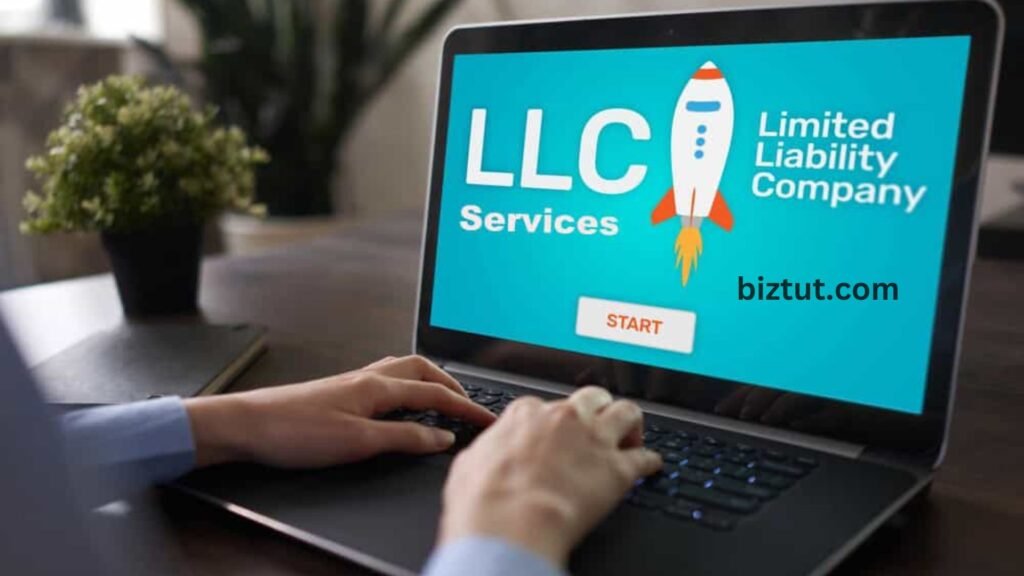If you’re eager to turn your passion into a money-making business, starting an LLC is a great way to protect your personal assets and enjoy the benefits of a structured setup. But where do you start?
This article will guide you through the steps to open an LLC, from picking a name to handling all the paperwork. This way, you can focus on growing your business with confidence. So, let’s get started!
How to Start an LLC in 7 Simple Steps
Many small business owners choose to start an LLC (Limited Liability Company) because it helps protect their personal assets from business debts. An LLC is its own legal entity, which means members aren’t personally responsible for what the business owes.

To set up an LLC, you’ll need to file the right paperwork with your state. Each state has its own rules and processes, but there are some common steps you can follow to get your LLC up and running.
Steps to Start an LLC
Step 1: Select and Hold on to a Name for Your LLC
In most states, no two businesses can have the same LLC name, even if they’re in different locations. For example, if you name your business “Joe’s Donuts, LLC,” no one else can use that name. Some states also restrict certain words in business names, like “bank.” Before you file your paperwork, it’s a good idea to check online to see if your chosen name is available.
You should also look around your area to make sure there aren’t similar businesses using the same or a similar name. Choosing a unique name helps avoid confusion and possible legal issues. Plus, see if a matching domain name is available for your website.
If you find the perfect name but aren’t ready to register your LLC just yet, most states let you reserve the name for a while by submitting a form and paying a fee. The reservation period and costs vary by state.
Step 2: Choose a Registered Agent
In almost every state, you need to pick a registered agent when starting your LLC. This agent will receive important legal documents, like lawsuits and subpoenas, on behalf of your LLC and pass them on to you.
Anyone over 18 can be a registered agent, including an LLC member or officer. You can also hire a professional registered agent service, like Northwest Registered Agent, for a fee.
Step 3: Submit Organizational Documentation to the State
The process for filing paperwork to start your LLC can differ from state to state, but you typically need to submit articles of organization that include:
- Your LLC’s name and address
- How long the LLC will exist (if not perpetual)
- The registered agent’s name and address
- Why you’re forming the LLC
- The signature of the person setting up the LLC
In most states, you’ll submit this paperwork to the secretary of state, but some states have a different agency that handles business filings. You’ll also have to pay a filing fee, which varies depending on the state.
Step 4: Prepare an LLC Operating Agreement
The operating agreement outlines how your LLC will be run. It includes important details like how ownership is shared, voting rights among members, profit and loss distribution, how meetings are conducted, member rights in case of death or departure, and how to dissolve the LLC if needed.
While you don’t have to file this agreement with the state, it’s a crucial document that helps clarify responsibilities and rights among members, reducing potential conflicts.
Step 5: Determine the Licenses Needed
Check what licenses or permits you might need to operate legally in your state. This will depend on your business type and location, so make sure you understand the requirements.
Step 6: Get an EIN
Next, you’ll need to apply for an Employer Identification Number (EIN) from the IRS. This number is like a Social Security Number for your business and is essential for things like opening a bank account, handling taxes, and hiring employees.
Step 7: Register to Do Business in Other States (Optional)
If your LLC plans to operate in multiple states, you might need to register in those states too. This usually involves similar paperwork to what you did when starting your LLC. You’ll also need a registered agent in each state where your LLC will do business.
LLCs are a popular choice for small business owners because they are flexible and easy to manage. Just remember to fill out all paperwork carefully and create an operating agreement to define everyone’s rights and responsibilities.
Crucial Actions to Take Following LLC Formation

File Annual Reports
Alright, so this step usually comes into play after you’ve been running your LLC for a tax year, but it’s good to know about it early. An annual report, also called a “statement of information,” is a way for your state to get important updates about your business. This includes any changes that have happened since your last report. It helps the state inform you of any new legal requirements, like licenses you might need to keep your business going.
Tip: When starting your LLC, it’s smart to set up a system for keeping track of all your business records. That way, you won’t waste time searching for important documents when deadlines are approaching!
What Should You Include in Your Annual Report?
You’ll need to include a few key details in your annual report, like:
- Your LLC’s name
- The office address
- Information about your registered agent (if you have one)
- The LLC number given to you by the secretary of state
Every state has its own rules about what needs to go in an annual report, so make sure you check the specific requirements for your state. The following are some crucial factors you must not overlook:
- Your main business address
- Names and addresses of members and managers
- Any important ID numbers for your business (like your state entity number)
- The purpose of your business
- A list of who can sign documents for the LLC
- Details about your registered agent
- Instructions on how to file the report
If you own an LLC, you can submit your annual report through your state’s website. Just remember, there’s usually a fee for submitting this report, and it varies by state. For example, Mississippi charges $50, while Massachusetts charges $500.
What Happens if You Don’t File Your Annual Report?
Even though it might seem like just another formality, filing your annual report on time is super important. If you don’t, you could face late fees, fines, or even have your LLC dissolved in some states.
Open a Business Bank Account
While you don’t legally have to have a separate business bank account for your LLC, it’s definitely a good idea. Here’s why:
- It helps protect your limited liability status by keeping your personal and business finances separate.
- It gives your business a more professional look, making you seem more reliable.
- It makes it easier for you to understand your finances when personal and business transactions are kept apart.
- It helps your accountant easily figure out which expenses are business-related, making tax time much smoother.
- Plus, keeping track of your business expenses helps you maintain a steady cash flow.
Obtain the Required Business Licenses and Permits
Many states don’t require a business license just to form an LLC, but it’s still important to get any necessary licenses and permits to make sure your LLC is operating legally. The specific requirements can vary by state, so check out the SBA website for details about what you need.
Here are some common types of licenses you might need:
- Health inspection certification
- Alarm permits
- Sales tax registration
- Weights and measures registration
- Unemployment and worker’s compensation registration
- General business licenses
- Professional/occupational licenses
How to Obtain Business Licenses and Permits?
First, pick the state where you’ll be doing business, then narrow it down to your city and county. Head over to the Small Business Administration’s website to find the regulations for your area. Make sure you have your Employer Identification Number (EIN) ready, which you can get from the IRS website. You’ll also need a business code, which you can find on various services online.
Don’t forget to check if you need any permits in addition to your business license. Lastly, be ready to pay a filing fee that can range from $50 to $500 with your credit card.
Learn More About Tax Requirements
When you start your LLC, it’s a great idea to hire an accountant who knows about LLC tax laws. Also, take some time to learn about the tax laws that apply to your business structure. How you get taxed will depend on how you decide to set up your business—whether it’s a Sole Proprietorship (for single-member LLCs), a Partnership (for multi-member LLCs), or if you choose to elect for S-Corp status. These choices are really important for your LLC’s success.
Accountants do more than just make sure you follow tax laws and file your returns on time. They can also help you save money with legal tax reduction techniques that a regular accountant might not know about. To keep your accounting costs down, make sure to keep your records organized!
LLC Tax Filing Tips
To start, make sure to identify any tax credits or deductions your LLC might qualify for. It’s also a good idea to mark your calendar with tax deadlines to stay on top of things. You could even hire a certified tax professional or accountant to help with your tax filings.
Lastly, make sure to do your homework on your state’s tax regulations since the forms you need for your LLC taxes will depend on a few things:
- Whether there are one or many members in your LLC
- If you’re considering corporate tax status options, especially if you choose the pass-through option
- If your LLC has employees, that needs to be considered too.
Get Business Insurance
If you run a business, having insurance is really important. It protects you from unexpected situations, like water damage, fire, or problems with meeting deadlines. It can also cover things like accidents involving employees, slip-and-fall injuries, and disruptions to your business due to supply chain issues. Some policies even cover business interruptions and legal expenses.
If a customer gets injured while on your property, you might need public liability insurance. The insurance requirements for LLCs can vary by state—some may require extra coverage while others let you choose what you need.
If you have employees, you’ll definitely need workers’ compensation, unemployment, and disability insurance. To find out exactly what insurance you need for your business, check out your state’s website.
Best LLC Formation Services
Starting a business can be a bit tricky and time-consuming, especially when it comes to getting it registered. There are so many legal and administrative tasks that entrepreneurs need to tackle, which can feel overwhelming. But don’t worry! There are plenty of online LLC registration services that can help make the process easier for you as you launch and manage your business.

In this blog post, we’ll take a look at some of the best business registration services out there and give you tips on how to pick the right one for your needs.
ZenBusiness
ZenBusiness is an online service that helps you form your LLC and offers a bunch of additional services to support small business owners. They provide affordable packages that include everything you need to get started, like registered agent services and filing your annual reports. Plus, ZenBusiness offers ongoing support and resources to help your business stay compliant and grow.
Swyft Filings
Swyft Filings is all about quick and easy LLC formation. They handle various tasks related to forming an LLC, including compliance and registered agent services. Swyft Filings provides personalized help to guide you through the formation process and ensure you meet federal and state requirements.
Tailor Brands
Tailor Brands is a cool digital platform that helps businesses create a consistent and professional brand image. They offer branding packages that include designing logos, business cards, and social media graphics. Tailor Brands also has a range of design tools and resources to help you create your unique brand assets.
Northwest Registered Agent
Northwest Registered Agent offers personalized support and various business solutions, such as registered agent services, document filing, and compliance management. They specialize in LLC formation and provide continuous resources and guidance to help businesses stay compliant and grow.
Incfile
Incfile is known for its fast and affordable LLC formation services. They offer registered agent services, compliance management, and document filing with multiple package options. Incfile makes the LLC formation process easy and straightforward with their user-friendly platform. They also provide ongoing support and resources to help your business thrive, making them a great choice for anyone looking to form an LLC affordably and conveniently.
With these services, starting your business can feel a lot more manageable. Just pick the one that fits your needs best, and you’ll be on your way to launching your venture!
Why Form an LLC?

LLCs are a popular choice for people and teams looking to kickstart a successful business. There are several reasons why many choose to form an LLC:
Low Startup Costs
Setting up and maintaining an LLC is usually cheaper than starting a corporation. In some states, you can create an LLC for under $100, which makes it a great option if you want to keep expenses low.
Tax Benefits
LLCs have the advantage of being treated as pass-through entities. This means that the business income is reported on your personal tax return, helping you avoid double taxation. Plus, LLCs can also be classified in different ways for tax purposes, such as sole proprietorships, partnerships, C-corporations, or S-corporations.
Liability Protection
The name “Limited Liability Company” says it all. Your personal assets are safer in the event that your company runs into legal trouble because an LLC shields its owners and members from personal liability. This protection comes from properly managing and safeguarding the business’s assets.

Easy to Start
Starting an LLC can be straightforward, especially with companies that can help you with the paperwork and annual tasks, like filing reports. It’s not too complicated to figure out!
Overall, forming an LLC can be a smart move for anyone looking to start a business while keeping costs down and protecting personal assets.
Types of LLCs to Consider

If you’re thinking about starting an LLC, it’s important to understand the different types of LLCs that are out there. Knowing these can help you choose the best structure for your business and what you want to achieve. These are the primary LLC types:
Single-Member LLC
This is when one person owns and runs the LLC. It’s similar to a sole proprietorship but offers better tax benefits and protection against personal liability.
Multi-Member LLC
This type of LLC has multiple owners and can be either manager-managed or member-managed. In a manager-managed LLC, one or more managers handle the day-to-day operations, while in a member-managed LLC, all members participate in running the business.
L3C
L3Cs, or low-profit liability companies, bridge the gap between nonprofit and for-profit LLCs. These entities focus more on their mission than on making money.

Series LLC
A Series LLC is a unique structure where one main LLC oversees several lower-level LLCs. Each of these operates independently, and their assets are kept separate from each other.
PLLC
A Professional Limited Liability Company (PLLC) is designed for licensed professionals like doctors and lawyers. It’s a specialized type of LLC that doesn’t apply to all businesses.
Also Read: How to expand into new markets 2024
Restricted LLC
These LLCs have specific limitations outlined in their articles of organization. They enjoy tax exemptions for the first 10 years after being formed but can’t distribute profits to their members. It’s important to clearly state these restrictions when setting up the LLC.
Anonymous LLC
An anonymous LLC keeps the owner’s identity private, as the state doesn’t publicly identify the owner. While forming an LLC usually means your information is on public record, some people prefer to keep their details private—like someone running a business from home. Only a few states, including Delaware, Nevada, New Mexico, and Wyoming, allow you to set up an LLC anonymously.
Overall, understanding these different types of LLCs can help you make the right choice for your business.





